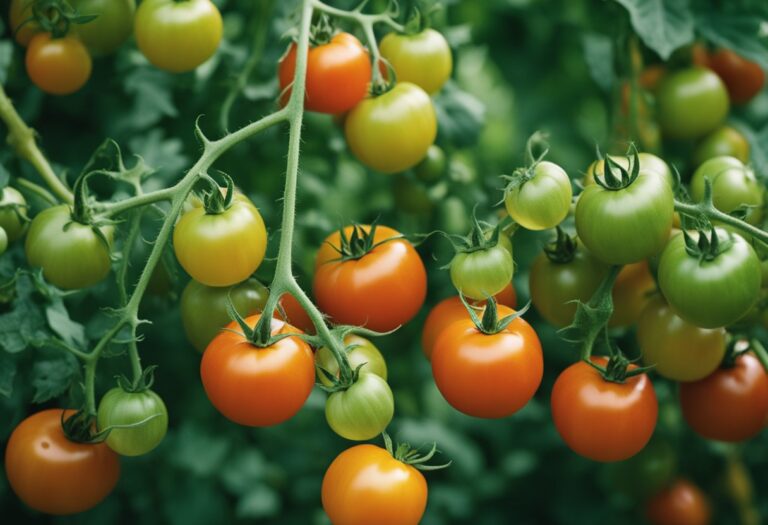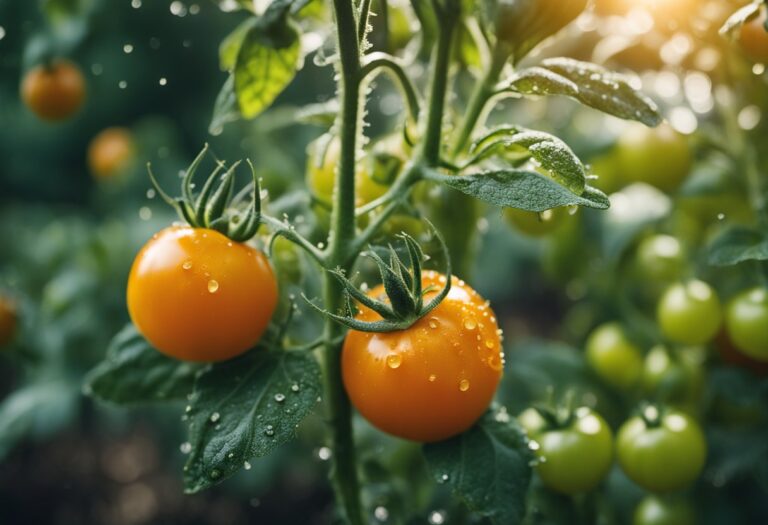Can Bunnies Eat Tomatoes? A Friendly Guide to Feeding Your Bunny
Bunnies are adorable and make great pets. However, if you’re a new bunny owner or considering to adopt one, you might have questions about their dietary needs. One of the most common questions is whether bunnies can eat tomatoes. The answer is yes, but with some important considerations.

Tomatoes are a good source of fiber, vitamins, minerals, and antioxidants for rabbits. They can be a healthy addition to a bunny’s diet when given in moderation and prepared correctly. However, tomatoes have some potential drawbacks such as sugar, fat, and solanine. It’s important to understand these risks and how to introduce tomatoes to your bunny safely. Keep reading to learn more about the topic and how to keep your bunny healthy and happy.
Key Takeaways
- Bunnies can eat tomatoes safely, but only in moderation and when prepared correctly.
- It’s important to understand the risks associated with feeding tomatoes to your bunny.
- Always monitor your bunny’s health and well-being, and consult with a veterinarian if you have any concerns.
Understanding Bunnies’ Dietary Needs

Bunnies are herbivores, which means their diet should consist of mostly hay, fresh vegetables, and fruits. They require a balanced diet to maintain good health and prevent diseases. A balanced diet for a bunny should contain a variety of nutrients, including fiber, protein, vitamins, and minerals.
Bunny owners should ensure that their pets have access to fresh hay at all times. Hay is an essential part of a bunny’s diet as it helps maintain a healthy digestive system and prevents dental problems. Fresh vegetables and fruits should also be included in a bunny’s diet, but in moderation.
It’s important to note that not all vegetables and fruits are safe for bunnies to eat. Some vegetables and fruits can be harmful and cause digestive issues. For example, bunnies should avoid eating onions, garlic, potatoes, and avocados.
Owners should also avoid feeding their bunnies sugary treats and processed foods. These foods can lead to obesity and other health problems. Instead, bunny owners should opt for healthy treats like fresh herbs, berries, and leafy greens.
In summary, a bunny’s diet should consist of fresh hay, vegetables, and fruits. Owners should ensure that their pets have access to a balanced diet to maintain good health and prevent diseases. Bunny owners should also avoid feeding their pets harmful foods and sugary treats.
Can Bunnies Eat Tomatoes Safely

Tomatoes are a common ingredient in many human meals, but can bunnies eat tomatoes safely? The answer is yes, but only in moderation. Here are some things to consider before feeding your bunny tomatoes.
Nutritional Benefits
Tomatoes are a good source of vitamins and minerals that can benefit your bunny’s health. They contain vitamin A, which is essential for good vision, as well as vitamin C, which supports the immune system. Tomatoes also contain antioxidants that can help protect against disease.
Potential Risks
While tomatoes can be a healthy treat for bunnies, there are some potential risks to keep in mind. First, tomatoes are high in sugar and can cause digestive problems if fed in excess. Second, the leaves and stems of tomato plants contain solanine, which can be toxic to bunnies if consumed in large quantities.
To minimize the risks, it is best to feed your bunny ripe tomatoes in small quantities as an occasional treat. Make sure to remove the stem and leaves before feeding, and avoid feeding green or unripe tomatoes. If you notice any signs of digestive distress, such as diarrhea or bloating, stop feeding tomatoes immediately and consult a veterinarian.
How to Introduce Tomatoes to Your Bunny
Tomatoes are a tasty treat for bunnies, but they should be introduced to their diet slowly and in moderation. Here are some tips for introducing tomatoes to your bunny’s diet.
Portion Control
When it comes to feeding your bunny tomatoes, portion control is key. While tomatoes are a healthy snack, too much of a good thing can be harmful. A good rule of thumb is to offer your bunny a small amount of tomato once or twice a week.
Frequency of Feeding
It is important to remember that tomatoes should not make up a significant portion of your bunny’s diet. They should be treated as a special treat, rather than a staple food. In addition to tomatoes, your bunny should be offered a variety of fresh vegetables and hay to ensure they are getting all of the nutrients they need.
Remember, every bunny is different, so it is important to monitor your bunny’s reaction to tomatoes and adjust their diet accordingly. If your bunny experiences any digestive issues or allergic reactions, stop feeding them tomatoes and consult with a veterinarian.
By following these guidelines, you can safely introduce tomatoes into your bunny’s diet and provide them with a healthy and tasty snack.
Alternatives to Tomatoes in a Bunny’s Diet
When it comes to feeding bunnies, variety is key. While tomatoes can be a tasty treat for your furry friend, it’s important to offer a range of fruits and vegetables to ensure a balanced diet. Here are some alternatives to tomatoes that can add variety to your bunny’s diet:
- Leafy Greens: Bunnies love leafy greens, and they’re packed with nutrients. Try offering your bunny a mix of kale, spinach, and romaine lettuce.
- Carrots: Carrots are a sweet and crunchy treat that bunnies enjoy. They’re also high in vitamin A, which is important for maintaining healthy eyesight.
- Berries: Strawberries, raspberries, and blueberries are all safe for bunnies to eat in moderation. They’re a sweet and juicy treat that can add some variety to your bunny’s diet.
- Herbs: Fresh herbs like parsley, cilantro, and basil can add some flavor to your bunny’s meals. They’re also a good source of vitamins and minerals.
Remember to introduce new foods slowly and in small quantities to avoid upsetting your bunny’s stomach. Offer a variety of foods to ensure a balanced diet, and always consult with a veterinarian if you have any concerns about your bunny’s nutrition.
Recognizing and Responding to Health Issues
Bunnies that eat tomatoes in moderation are not likely to experience any health issues. However, if a rabbit eats too many tomatoes, it can lead to digestive problems such as diarrhea and bloating. Therefore, it is important to monitor your bunny’s tomato intake and provide them with plenty of fresh water to help prevent dehydration.
In addition, if your bunny exhibits any signs of illness such as lethargy, loss of appetite, or diarrhea, it is important to seek veterinary care immediately. These symptoms could indicate a more serious health issue and require prompt attention.
To keep your bunny healthy, it is important to provide them with a balanced diet that includes hay, fresh vegetables, and a limited amount of fruit. Tomatoes can be given as an occasional treat, but they should not be a staple of your bunny’s diet.
By recognizing and responding to health issues promptly, you can help ensure that your bunny remains happy and healthy for years to come.
Frequently Asked Questions
Is it safe for bunnies to eat tomato seeds?
Tomato seeds are not toxic to rabbits, but they are not recommended to be included in their diet. Tomato seeds can cause digestive problems and may lead to constipation or even intestinal blockage in rabbits.
How often can rabbits safely consume tomatoes?
Rabbits can safely consume tomatoes as an occasional treat. A small amount of tomato, about one or two cherry tomatoes, once or twice a week is sufficient. Overfeeding tomatoes to rabbits can cause digestive issues, including diarrhea.
Are cherry tomatoes a good snack for bunnies?
Cherry tomatoes are a good snack for bunnies as they are small and easy to eat. However, they should be given in moderation, as too much of any food can cause digestive problems for rabbits.
Can rabbits have tomato leaves, or are they harmful?
Tomato leaves are harmful to rabbits and should never be fed to them. Tomato leaves contain solanine, a toxic substance that can cause digestive problems, seizures, and even death in rabbits.
What types of fruits are considered safe for rabbits to eat?
Rabbits can safely eat a variety of fruits, including apples, bananas, blueberries, strawberries, raspberries, and watermelon. However, fruits should be given in moderation, as they are high in sugar and can cause digestive problems if overfed.
Are there any fruits or vegetables that are toxic to rabbits?
Yes, some fruits and vegetables are toxic to rabbits and should be avoided. These include avocado, rhubarb, and potatoes. Additionally, some fruits, such as grapes and raisins, can cause kidney failure in rabbits and should also be avoided.


